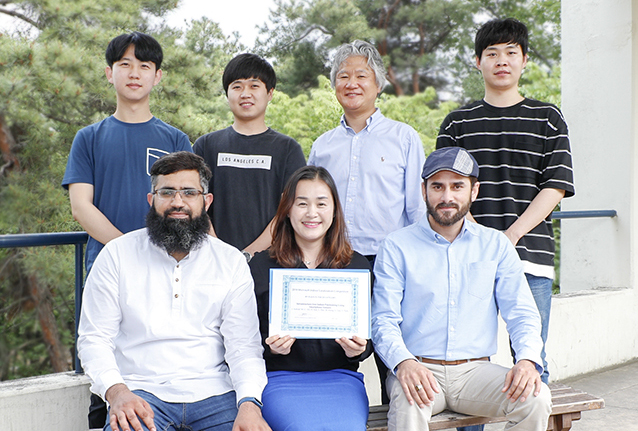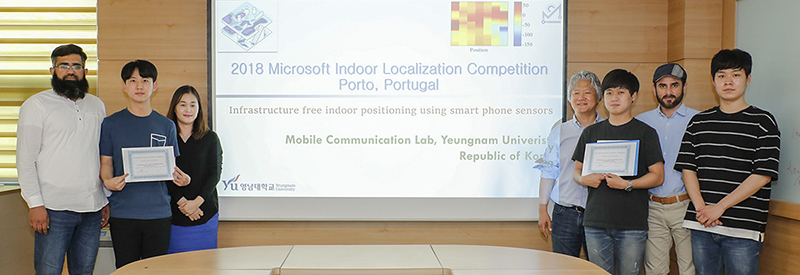YU Research Team Third Place in the Microsoft Indoor Localization Competition N
No.89061- Writer pr
- Date : 2018.06.07 11:30
- Views : 8068
Department of Information and Communication Engineering Professor Park Yong-wan’s research team participated in the smart-phone based localization system construction
Recognized for world-class in indoor localization system-based technologies
Large marketability such as expandability so expected to be used by both individuals and industries
[May 29, 2018]
Recognized for world-class in indoor localization system-based technologies
Large marketability such as expandability so expected to be used by both individuals and industries
[May 29, 2018]

<Department of Information and Communication Engineering Professor Park Yong-wan’s research team who took third place at the '2018 Microsoft Indoor Localization Competition'>
(From bottom left: Muhammad Usman Ali, Heo Su-jeong, Ashraf Imran; from top left: Lee Chan-seok, Sohn Hee-dong, Professor Park Yong-wan, Kang Min-gyu)
(From bottom left: Muhammad Usman Ali, Heo Su-jeong, Ashraf Imran; from top left: Lee Chan-seok, Sohn Hee-dong, Professor Park Yong-wan, Kang Min-gyu)
The indoor localization system developed by a research team from YU took third place in an international indoor localization competition hosted by Microsoft.
At the 2018 Microsoft Indoor Localization Competition hosted by Microsoft in Porto, Portugal from April 10 to 11, Professor Park Yong-wan (57) of the YU Department of Information and Communication Engineering), Professor Heo Su-jeong (40) of the BK21+ project team, and graduate school students Muhammad Usman Ali (38, completed PhD course), Ashraf Imran (35, completed PhD course), Sohn Hee-dong (26, second semester in master’s degree program), Kang Min-Gyu (26, second semester in master’s degree program), and undergraduate student Lee Chan-seok (25, Department of Information and Communication Engineering, senior) won third place.
This contest is on measuring the accuracy of real-time indoor position recognition systems. This is the fifth competition since first being held in Berlin, Germany in 2014. It is hosted and sponsored by global companies and research institutes such as Microsoft, Google, Intel, Bosch, and Carnegie Mellon University showing the global interest on indoor localization technologies.
At the 2018 Microsoft Indoor Localization Competition hosted by Microsoft in Porto, Portugal from April 10 to 11, Professor Park Yong-wan (57) of the YU Department of Information and Communication Engineering), Professor Heo Su-jeong (40) of the BK21+ project team, and graduate school students Muhammad Usman Ali (38, completed PhD course), Ashraf Imran (35, completed PhD course), Sohn Hee-dong (26, second semester in master’s degree program), Kang Min-Gyu (26, second semester in master’s degree program), and undergraduate student Lee Chan-seok (25, Department of Information and Communication Engineering, senior) won third place.
This contest is on measuring the accuracy of real-time indoor position recognition systems. This is the fifth competition since first being held in Berlin, Germany in 2014. It is hosted and sponsored by global companies and research institutes such as Microsoft, Google, Intel, Bosch, and Carnegie Mellon University showing the global interest on indoor localization technologies.
A total of 33 teams from 15 countries around the world participated in the first sector (2D localization) on smart-phone based localization system construction and the second sector (3D localization) on localization systems based on sensors. On the first day, lab environments were constructed and the stadium was analyzed and on the second day, locations were checked in real-time at the point designated by the host.

The YU team exhibited a system of sending user location information confirmed through the Earth’s magnetic field sensor, Wifi, and walking navigation algorithms through a smartphone application that it developed. The YU team took third place from a total of 13 teams that participated in the first sector with a location accuracy of 3.2m, which was just 0.9m lower than the Israeli team that took first place.
In particular, the technology developed by the YU research team received good reviews from participants for its expandability in terms of indoor localization system technologies and marketability. The research team said, “When using a smart phone camera and walking navigation localization, accuracy can be improved, but the power consumption of smart phones is high and there are also problems that real-time location information cannot be guaranteed in large indoor environments such as shopping malls due to the size of the data.” They added, “The YU research team solved the issue with unstable radio wave resource localization in indoor environments with the Earth’s magnetic field. After precisely setting the initial location with Wifi, this technology cannot provide real-time user location and therefore, it is the most suitable technology for constructing indoor navigation systems of smart phone users.”
Recently, buildings are growing in size due to skyscrapers and shopping complexes, and underground spaces are also expanding with the development of subways. Therefore, indoor navigation is receiving attention as a core future technology and is expected to have significantly more uses and hence, the research results of the YU research team are receiving more attention.
Professor Park Yong-wan who headed the research team said, “This proved that indoor location system-based technology possessed by YU is at a world-class level. YU’s technology, which was a runner up in last year’s ‘IPIN 2017’ procured both B2C and B2B marketability and it can thus be used as core technologies for the fourth industrial revolution.”